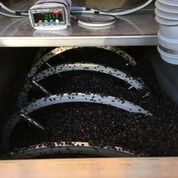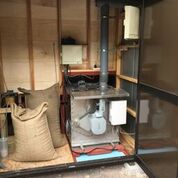- Sanitation systems
- Toilets without urine diversion
- Composting toilets, Arborloos
- Composting toilets do not produce compost - true or false? And is "composting toilet" a misnomer?
Composting toilets do not produce compost - true or false? And is "composting toilet" a misnomer?
144k views
- joeturner
-
 Less
Less- Posts: 717
- Karma: 23
- Likes received: 185
Re: Composting toilets do not produce compost - true or false? And is "composting toilet" a misnomer?
The key point here is about reliability. If we can't be sure that an unmonitored system actually destroys pathogens to safe levels then I don't believe it can be described as sustainable sanitation.
The small number of studies which have calculated the risk of infection using known microbiological methods have shown that the chances of catching an infection when handling materials from an unmonitored composting toilet is extremely high. Way beyond what is acceptable in places where few barriers to infection exist.
See Save Kumwenda's work that concluded
"The risk of 5.6× 10−1 means that about 6 out of 10 (60%) people using FAs or UDDTs will be infected by A. lumbricoides during a year or at an individual level; it means that out of ten exposures to sludge 6 times will result in infection. The risk obtained was above the WHO recommendation of between
10−4 and 10−3 infections per year"
forum.susana.org/uddts-for-particular-si...d-latrines-in-malawi
I don't believe there is any significant difference between the toilets in these studies and the general understanding of a "composting toilet" as per wikipedia.
Please Log in to join the conversation.
You need to login to reply- hajo
-

- retired in Germany... but still interested in water and sanitation... especially in OSS... and especially in Africa...
Less- Posts: 288
- Karma: 15
- Likes received: 156
Re: Composting toilets do not produce compost - true or false? And is "composting toilet" a misnomer?
I agree with you that we have to differentiate between primary and secondary composting... and that 'composting toilets' should be understood as primary composting 'system' where the composting is supposed to take place in a 'vessel/vault' under the toilet.
And you are of the opinion that primary composting under the toilet, producing safe compost, free of pathogens has not yet been achieved. Did you have a look at vermi-composting/-filtration/-culture ?
The worms seem to destroy most pathogens reliably producing a safe and nutritional humus. It is still questionable whether ascaris are also destroyed or only be washed out with the effluent. But at least the humus should be free of pathogens. I express this all with caution as I have not heard of/read a report which confirms one or the other. But maybe you have information about this.
ciao
Hajo
Albert Einstein
Any intelligent fool can make things bigger and more complex... It takes a touch of a genius - and a lot of courage to move in the opposite direction.
E.F. Schumacher
Everything should be made as simple as possible, but not simpler.
Albert Einstein
Please Log in to join the conversation.
You need to login to reply- joeturner
-
 Less
Less- Posts: 717
- Karma: 23
- Likes received: 185
Re: Composting toilets do not produce compost - true or false? And is "composting toilet" a misnomer?
The efficiency of secondary composting treatment (where collected material is composted somewhere else) is a whole other issue.
As I said above, I don't believe the majority of people who look at the "Composting toilet" page on Wikipedia are thinking that it means collection and secondary treatment.
There is a mountain of published research about many different secondary faecal composting systems - which, given the right conditions, destroys pathogens reliably.
There are some new studies of material collected beneath toilets - where it is euphemistically described as composting - where pathogens have not been reliably destroyed.
Unfortunately I don't have time at the moment to work on the Wikipedia page, but the papers are not difficult to find.
Secondary faecal composting can work. Primary faecal composting beneath toilets is a misnomer.
Please Log in to join the conversation.
You need to login to reply- Elisabeth
-
- User is blocked
- Freelance consultant since 2012
Less- Posts: 3372
- Karma: 54
- Likes received: 932
Re: Composting toilets do not produce compost - true or false? And is "composting toilet" a misnomer?
The Wikipedia article on composting toilets mentions "secondary composting" twice but does not explain it. This could be improved upon.
Then there is also the Wikipedia article on composting. It refers to composting toilets in two places. Here:
en.wikipedia.org/wiki/Compost#Human_excreta_and_sewage_sludge and here:
en.wikipedia.org/wiki/Compost#Composting_toilets
If you have collected some good references that discuss the issue of pathogen destruction during composting of faecal matter then it would be helpful to insert them into the relevant places of the second Wikipedia article. If you have time. If not, you could also list them here for now (or on the talk page (en.wikipedia.org/wiki/Talk:Compost)) and then hopefully over time we can add them.
Elisabeth
Freelance consultant on environmental and climate projects
Please Log in to join the conversation.
You need to login to reply- joeturner
-
 Less
Less- Posts: 717
- Karma: 23
- Likes received: 185
Re: Which composting toilet to choose - recommendations, please?
But no, I thought the discussion here was mostly about the kinds of system where there is no secondary treatment. In my experience this tends to be what most people think they mean when they talk about "composting toilets".
If one is collecting materials beneath a toilet, with irregular and basically random additions of carbon, the evidence is that pathogens are not reliably destroyed even with long storage times.
If one is collecting that material for secondary treatment - particularly where that's at a properly monitored site, that's a different thing.
The latter may well be sufficient to sanitise material of the pathogens. The former, in places where the pathogens are endemic (and specifically where other barriers do not exist) is not.
It seems quite straightforward to me - the matter is only confused when people insist that composting is occuring in places where there is a) insufficient carbon b) insufficient oxygen and c) no monitoring. That cannot be true.
Please Log in to join the conversation.
You need to login to reply- Elisabeth
-
- User is blocked
- Freelance consultant since 2012
Less- Posts: 3372
- Karma: 54
- Likes received: 932
Re: Which composting toilet to choose - recommendations, please?
- The posts about Kimberley's system in Portland, Oregon are now here: forum.susana.org/98-resource-recovery-fr...-portland-oregon-usa
- The posts about use of urine in allotment gardens in the UK are now here: forum.susana.org/175-urine-reuse-or-infi...-the-uk-use-of-urine
(are there any other posts that should be moved into sub-threads? I wasn't sure about the discussion between Joe and Dean)
I'd like to see if we can get some form of "conclusion" for this thread. Is anyone game to do up a short summary of the discussion to date?
And should we look into whether SuSanA could put out a statement of sorts to highlight this issue of composting toilets to the sector? Perhaps even agree on no longer using the term "composting toilets" in any of SuSanA's future publications? Something like that should perhaps be brought up through one of the working groups, such as Working Group 4 on sanitation systems.
As an interim step or a parallel activity, I would still like to collectively work on the Wikipedia article on composting toilets (en.wikipedia.org/wiki/Composting_toilet). It gets about 700 views per day - this is not insignificant! We cannot for now, change the article's title (because "composting toilets" is what they are called at present). But we can add information into the article about the controversial nature of this name - provided we have reliable sources to quote. Quoting this forum discussion is not good enough for a Wikipedia article. Which other publication is out there that explicitly questions using the term "composting toilet"? Have you published anything on this, Geoff? Even a newspaper article could work as a source for such a statement (but is not ideal).
Joe wrote on 14 July:
To that I would say "Yes, please".There have been a lot of studies published in the literature in the last 18 months looking at pathogen survival in composting toilet systems. Enough that I think we may need to conduct a widespread review of the Wikipedia page to take account of them - some including risk (using Monte Carlo systems) DALYs of handling and using the materials etc.
(when you say "composting toilet systems" would that include those systems that don't do the composting in the toilet itself but in a secondary treatment step? Is there a distinction to be made between "composting toilet" and "composting toilet system", are they two different things?)
Elisabeth
Freelance consultant on environmental and climate projects
Please Log in to join the conversation.
You need to login to replyRe: Which composting toilet to choose - recommendations, please?
IWA Blue-Green Systems | Compost Toilet System paper
See also here: forum.susana.org/98-resource-recovery-fr...-portland-oregon-usa
Please Log in to join the conversation.
You need to login to replyRe: [SuSanA Forum] Composting toilets do not produce compost - true or false? And is "composting toilet" a misnomer? (Composting toilets, Arborloos)
However the question is not about "technogies" or "products" per se. Composting is a process that has key parts and biochemistry, and minus any of these, I am professing it not be called composting.
If a water treatment system advertised that it treated the water to make it safe, but in fact it just shone a green LED at the water as it passed through, would we allow it? Accept it? Would we allow it to be called "treatment" if we knew many many people were going to use it and even love it?
We are arguing about a word, a definition, similar to "treatment" for water, but for solid pathogen rich human waste. Composting does not happen under a toilet hole. We should not proliferate the term composting toilet.
Geoff Hill
Toilet Tech 206-966-6009
Please Log in to join the conversation.
You need to login to reply- Elisabeth
-
- User is blocked
- Freelance consultant since 2012
Less- Posts: 3372
- Karma: 54
- Likes received: 932
Re: Composting toilets do not produce compost - true or false? And is "composting toilet" a misnomer?
It's been an interesting discussion so far. I am still keen to work on the definition issue a bit further and the best place to do that is on Wikipedia, I think. There is a separate thread for that here: forum.susana.org/discussions-about-speci...e-on-wikipedia#27525 . So anyone who wants to help spread useful, objective, verifiable information about composting toilets via Wikipedia please head over to that thread.
I also wanted to react to Geoff's statement:
Again, one key question that nobody has addressed:
Is Susana (and the forum) a popular public access forum for people to share their opinions, or does it have purpose / a mandate to protect public health and guide development with this as a guiding principle.
If the first (public open forum) this forum is well populated with full spectrum of opinions, people can read and make their own mind up.
If the second (with mandate to protect human health), someone needs to step in and help draw conclusions and make statements.
If the second, Susana needs to define what compost means to them, with regards to their mission and mandate. Is it the rotting of organic waste in a pile to make soil conditioner? Or is it an engineered process with controls and critical check points to be sure to minimize risk and provide high confidence to low-skill, minimal PPE wearing operators, and un-informed end-user (subsistence farmers).
Here I think we should distinguish between the SuSanA discussion forum and SuSanA as a network/platform/alliance.
The SuSanA discussion forum certainly fulfills the role that you have described in your first point. The purpose of the forum is:
"The Forum enables us to freely share knowledge and ideas about sustainable sanitation within the network and beyond.” If someone was spreading blatantly wrong misinformation or off-topic stuff then I'd step in as a moderator and it would most likely be deleted. But if people have different interpretations of the same data sets, different assessment of what is a high risk and what not, then we need to allow the discussion to take place and readers can draw their own conclusions.
Regarding your second point: SuSanA as a network/alliance/platform does not have a mandate to "endorse" or not endorse particular technologies. You will see in all of SuSanA's publications that we do not go down to that level of detail. The SuSanA publications remain rather higher level. See all SuSanA publications here in the library: www.susana.org/en/knowledge-hub/resource...5&vbl_2%5B%5D=&test= The publications talk about sustainable (and safe) sanitation as the aim, meeting SDG 6 but do not try to mandate which technology to use or not use. Yes, there has been a bit of an emphasis on safe reuse activities in the past as they can lead to a more sustainable system overall but if it's not safe then don't do it. And yes, UDDTs do feature in a lot of publications of our SuSanA partners as they have some advantages, particularly if water is scarce. But again, there is no SuSanA publication that would stipulate that UDDTs are the preferred technology choice in all circumstances.
Also, no SuSanA publication says that you should compromise on safety with regards to spreading something (treated human excreta) on vegetables that are to be eaten raw if it is not safe to do so.
I think Dean made a good point in his post from 16 July:
There also needs to be some context around what is "safe". Safe to be handled and spread around? Safe to put around food crops that will be eaten raw? Safe to sell as a product? These are all different, I'd be happy to spread compost full of helminths around some trees, I'd just wear gloves and maybe a dust mask to be safe. What I'm most interested in is a product safe to spread around in crops, but even this safety level varies according to whether the crop is to be cooked or eaten raw.
Regards,
Elisabeth
Freelance consultant on environmental and climate projects
Please Log in to join the conversation.
You need to login to reply- joeturner
-
 Less
Less- Posts: 717
- Karma: 23
- Likes received: 185
Re: Which composting toilet to choose - recommendations, please?
If faeces composting does not consistently reach 55 degrees, secondary treatment is necessary.
Dry vaults below toilets might well have various advantages. But the one thing we can be sure about is that in places where pathogens are endemic (especially where healthcare is difficult), low temperature "composting" is not sufficient to kill pathogens.
Again, that might not matter if other barriers are in place - healthcare, education, regulations, inspections, secondary treatment, gloves, specialist skills etc.
But in the majority of places where "composting toilets" are being marketed, the barriers don't exist.
Please Log in to join the conversation.
You need to login to reply- Ronniedeb
-

- Alternative sanitation designer and consultant, landscape architect
Less- Posts: 14
- Likes received: 1
Re: Which composting toilet to choose - recommendations, please?
I think, if we are very technical, All dry toilet systems, of which there are many, facilitate composting to some degree. This does not always result in a beautiful, fully stabilised, sanitised "compost" except in the case of the very sophisticated BioR21 type, which carries-out 100% aerobic composting, but then also uses quite a lot of electricity.
I am personally involved in the sale, installation and maintenance of dry and composting toilets here in the west and I am in regular conversations with wastewater engineers and legislators on the merits of dry sanitation from an environmental, financial and health point of view, and in my opinion, the point is to compare like with like (regardless of composting performance):
1. Volume - keeping it dry reduces the volumes of waste by 100's of multiples
2. Introduction of air/oxygen - whether the composting is happening fast or slow, most human enteric pathogens come from an anaerobic environment in the body and tend to thrive in nutrient-rich water(I know...there are limitations to that statement) but are more likely to be deemed inactive once in an aerobic environment (once such an environment is maintained).
3. Solid waste and separated leachate/urine (whatever the system may be) are considerably less likely to transport pathogens and enrichment to any distance from the facility, E.G to ground water, surface water and the catchments connected to them.
When I design and build composting toilets I always incorporate a secondary treatment for both the solids and the liquids(which should always be separate) before land application. This could be a wood-chip composter for the liquids and a wormery for the solids or a serviceable transfer to a composting facility. In some cases, like in forestry or scrubland, it is possible to percolate leachate and Nitrified urine to the ground via the surface once good dispersal is observed, anyway you are talking relatively small quantities, even in busy public toilets.
To sum it up, I personally distance myself from the term "composting toilets" and rather use "dry toilets" or even "waterless toilets" but that is due to the bad reputation that poorly designed "composting toilet"systems had gotten over the years. The truth is that one way or the other, composting does take place and so the term is fair in my opinion.
See attachment below - pictures of BioR21 which we use and install, and is a true composting machine (you can hold the compost in your hands the next day)
Attachments:
-
 EVgjKTrg.jpeg
(Filesize: 9KB)
EVgjKTrg.jpeg
(Filesize: 9KB)
-
 JKcSv8-w.jpeg
(Filesize: 9KB)
JKcSv8-w.jpeg
(Filesize: 9KB)
Please Log in to join the conversation.
You need to login to reply- joeturner
-
 Less
Less- Posts: 717
- Karma: 23
- Likes received: 185
Re: Which composting toilet to choose - recommendations, please?
If we know that systems do not kill pathogens and we then are telling people that the material is safe to handle and spread on vegetables, then I think we are adding to the problem of disease, not helping reduce it.
And if we can't be sure of systems because we can't afford the microbiological testing - then we need to stop encouraging the use of them.
Please Log in to join the conversation.
You need to login to reply- Sanitation systems
- Toilets without urine diversion
- Composting toilets, Arborloos
- Composting toilets do not produce compost - true or false? And is "composting toilet" a misnomer?







